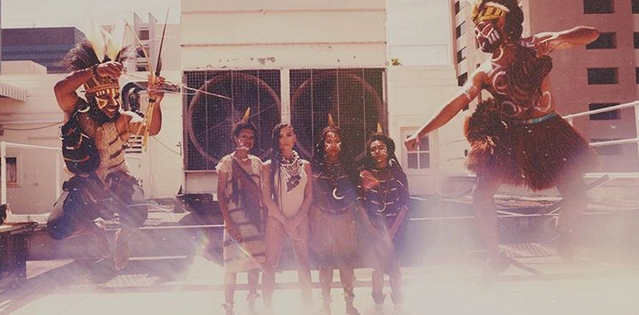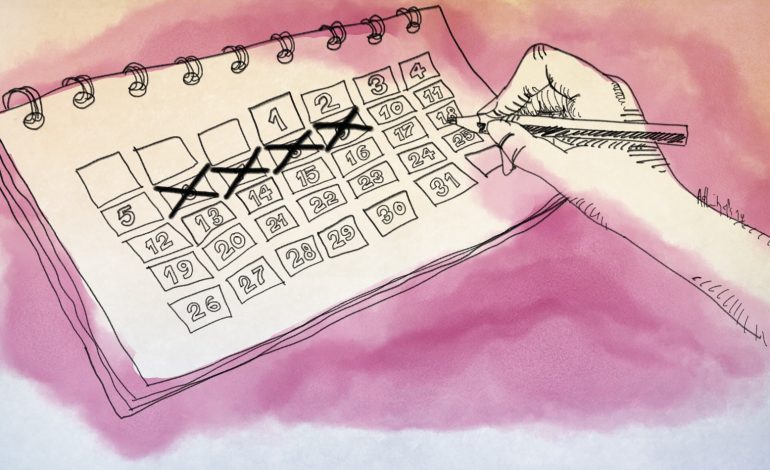The Orientalist Gaze in Agnez Mo’s American Persona

“Pimpin’ hard, it’s an art.”
Here comes Agnez Mo, gliding her way on the terrace of a beachfront mansion in a body-hugging tube top and black lacy tights. A magnificent batik cape is draped on her shoulder and an absurdly huge and Asian-looking piece balanced on her head, as she affects the look of “sexy jaded”. A dagger in her hand and a token hot shirtless guy in tow, she sings of money, sex and lace, and not caring about what people say.
In case you’ve been holed up in a cave somewhere, Agnez Mo is the latest incarnation of Agnes Monica, the former child celebrity, actress, singer, and generally a household name for many Indonesians. Agnez Mo is the persona she has settled into in recent years when she introduced herself to the American audience. This particular music video of the song “Long As I Get Paid” has been watched 16 million times on YouTube since it was released last month, and it has received both praises an criticism.
Born in the early 90s, I grew up watching “Agnes Monica” as a presenter in “Tralala Trilili” kids music program and then as the vibrant and lively characters in various family series, Mr. Hologram and Lupus Milenia. My family and I also loved watching her drama, Pernikahan Dini, in which she played a teenage girl who has to get married because of unplanned pregnancy, as well as dozens of roles in TV shows and films afterwards. Her acting career went hand in hand with her music career. She released her first album when she was just six, five albums followed, plus two international English-speaking ones: the self-titled album and the one released a couple weeks ago, X.
But the evolution path of Agnez Mo has not always been a smooth one. Unlike that other Indonesian-born artist Anggun (nee Anggun Cipta Sasmi), whose international career, generally inspired respect, Agnez Mo has been as divisive a pop-culture figure in Indonesia as, say, Taylor Swift. It seems you either love her or hate her.
And those that remain in between may have mixed feelings about the way she presents herself to the American audience. For one the overt sexuality of her music video masks her true potential.
A comment under username *Mrs. Voldemort* in Long As I Get Paid music video encapsulated the sentiment: “I love Agnez Mo, but I got to [sic] admit her English language songs weren’t as great as her Indonesian work. I would completely forget about this song in the next 5 minutes, unlike her Indonesian songs that stuck in my head for years! The only good thing here is the beautiful fabrics/dresses. I hope she sings more instead of just [doing] sexualized beats like this, this is so American. (…)Agnez Mo has amazing vocal, technique, and range! But [no] thanks to this ‘Nicki Minaj level’ music, people outside of Indonesia didn’t know that yet(…)”.
Overt sexuality may be the American way of shedding off one’s child stars’ persona, like what happened with Christina Aguilera, Lindsay Lohan, or Miley Cyrus. Remember when Miley tried to grow out of Hannah Montana? This article explains how Miley as a former child star felt the need to “assert the control she lacked for years”, the control to define her own identity, which isn’t attached to the fictional character she had played. From good girl Hannah Montana, she became wild-child Miley: shaved head, provocative dresses, sexual gestures.
Is this the case with Agnez too?
Most possibly not. For one, since her childhood star days, the 31 year old has continued to invent and reinvent her public self in different stages of her life. Having grown out of her child singer persona, she became an energetic teenage actress slash singer slash dancer. She then transformed into a top-chart Asian pop diva and a judge in talent shows. In short, she is far removed from that awkward post-adolescence identity-crisis phase.
But whoever she has been at the moment, one trait is always expected of her by her Indonesian fans, and that is modesty. Physically attractive and fit though she always has been, Agnez was never known for exploiting her sexuality. Instead of a party animal, those who work with her credit her for being a consummate and driven artist. She always knows what she wants, just ask her designer Anne Avantie and her stylist Rose Sims.
Ever the Miss Perfectionist, Agnez told Vogue recently, “I’m my own biggest critic. I want things to be perfect. It’s not about arrogance – it’s about realizing that I’m evolving and I’m moving in the right direction.”
Still, she appears to have been bothered by the Indonesian audience criticism of her big ambition, so much that she felt the need to defend herself from the allegations of being “arrogant”, “rude” and “conceited” in haters-dissing songs like “Long as I Get Paid”.
If the album is really her attempt to break away from those “noises”, being the opposite of modest is what she finally believed as “her most honest and authentic self.” But what if this honest and authentic self comes with a set of problems?
The Orientalist Gaze
In the cutaway shots in her music videos “Coke Bottle” and “Long As I Get Paid”, Agnez gets steamy with African American guys and doing lap dance and strip dance for them.
The many sexually suggestive shots and the dominatrix role she plays in “Long As I Get Paid.” In short Agnez’ music videos shows merely follow the sex-sell formula that prevails in the RnB and hip-hop scene. Her MVs affirms the presence of male gaze, which explicitly depicts women as visual objects for male sexual pleasure or male spectators.
Blatant orientalism is also shown in the music videos, particularly in “Long as I Get Paid”. Coined by literary theorist and journalist Edward W. Said, orientalism refers to the way of seeing or imagining that exaggerates or distorts the perception of “the East” (Middle East, Asia) in comparison to “the West” (Europe and the U.S.). Usually it involves perceiving the culture or elements coming from “the East” as exotic, mysterious, inferior, or sometimes dangerous, and how it totally differs from the civilized “West”. Orientalism acknowledged how the depiction of women of “the East”, presented in novels, epics, and paintings, have been eroticized and exoticized for the pleasure of “the West” male voyeur.
In the MV, Agnez’s glamorized look involved a majestic batik costume that accentuates her curves and cleavage with a thick cape that she gracefully drags in slow motion. In an interview she said she only intended to “combine the modern and the traditional.” She wanted to make batik “less boring”, she claimed.
I’m afraid it’s not that simple, though. Batik may have become synonymous with modern esthetic when it comes to fashion design today, but what Agnez does with batik removes it so far out of the context and uses it as a tool of to exaggerate exoticism, eroticism and that Asian mystery. The way she represents her image goes back to building an unrealistic fantasy of how exotic Asian women are for Western male pleasure.
This doesn’t mean that she has lost a significant chunk of her fans, however. Many have approved her ways of presenting herself to the U.S. audience and appreciate her bringing batik along into the scene. Others might say she could’ve chosen a different self-image. They pointed out that Malaysian RnB singer-songwriter Yuna could exist in the international RnB scene and stick to her original style. But, then again, of course, Agnez aims for the stars, and so she should.
With her drive and her talent, it’s obvious Agnez is not one to quit. She will continue to explore herself in ways that will probably invite more “noises” and judgment. She might just get away with hypersexualized and orientalist approaches this time. But let’s hope she won’t one day show up with a dreadlock or commit some cultural appropriating gaffe merely to prove her street cred.
*Credits: Photo is retrieved from Long as I Get Paid music video
Find out why death penalty is cruel, unnecessary and must be abolished.






















